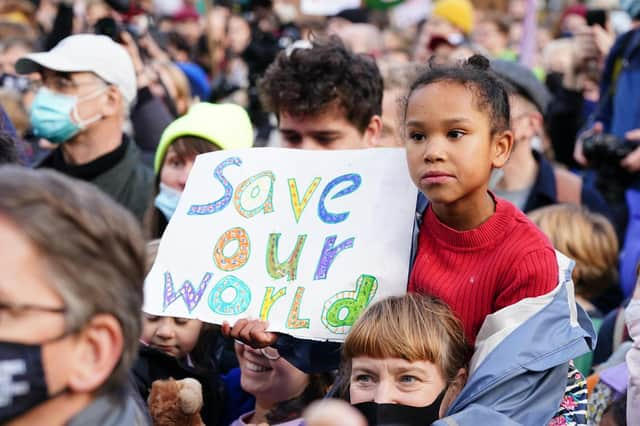Cop26: Some communities may feel 'deeply threatened' by green transition, Leeds academic warns


Professor Andy Gouldson has said that the region “knows all too well what a brutal energy transition feels like” after the end of coal in the 1980s, and for many “the scars from that still run deep”.
His comments came as delegates continue high-level talks at the COP26 summit in Glasgow, aiming to reach agreements to restrict global temperature increases to 1.5c above pre-industrial levels.
Advertisement
Hide AdAdvertisement
Hide AdYesterday, thousands of young people were led by activist Greta Thunberg and marched through the Scottish city to demand action on climate change.
Speaking to The Yorkshire Post this week, Prof Gouldson, said that there are lots of opportunities for the county as technology and jobs shift towards greener alternatives.
However he accepted that some may be more reluctant than others to get on board.
“I think one of the big issues for Yorkshire is around our history,” he said.
Advertisement
Hide AdAdvertisement
Hide Ad“Yorkshire knows all too well what a brutal energy transition feels like from the 1980s and what happened with the end of coal and the industrialisation around that.”
He added “I think the scars from that still run deep, and it was done in a very brutal top down way, and the last thing we would want to do is to repeat any aspect of that, so we need to include people in the process.”
Prof Gouldson, an expert in environmental policy and also directs the Yorkshire and Humber Climate Commission believes that there is a “massive opportunity” for Yorkshire to capitalise on the changing energy sectors and “more broadly in the green economy”.
These can, he says,“show how transitioning and adopting climate action can really help us to be, a more prosperous, thriving region”.
Advertisement
Hide AdAdvertisement
Hide AdHowever, he wants those who may be trepidatious to remain at the forefront of policy-makers’ minds.
“We need to acknowledge that some groups, some sectors, some businesses, some people, some communities will feel deeply threatened by this agenda.
“Rather than ignoring them and doing it anyway, I think we should involve them in the process and find ways of supporting them to make that transition, so that this is something that’s done by us and for us, rather than to us as it were.”
While Prof Gouldson has shared his concerns that there may be reluctance to go green among certain groups, plenty of young people have shown their enthusiasm in taking their campaigning to the streets.
Advertisement
Hide AdAdvertisement
Hide AdYesterday’s march in Glasgow was the latest in a long line of so-called climate strikes, with students missing school to protest.
As many as 8,000 people were expected to match from Kelvin Grove Park to George Square in central Glasgow yesterday alongside campaigner Ms Thunberg.
More events are expected in cities across the UK today.
But in London, Downing Street said young people missing school to attend the demonstration was “extremely disruptive at a time when the pandemic has already had a huge impact on their learning”.
A spokesman for the Prime Minister said yesterday: “We do understand why young people feel so strongly about climate change, and we want to see them use that passion and turn it into action.
“That’s exactly why we’re empowering them through our new virtual national education park, climate leaders awards, and giving teachers the tools to put climate change at the heart of the curriculum.”
